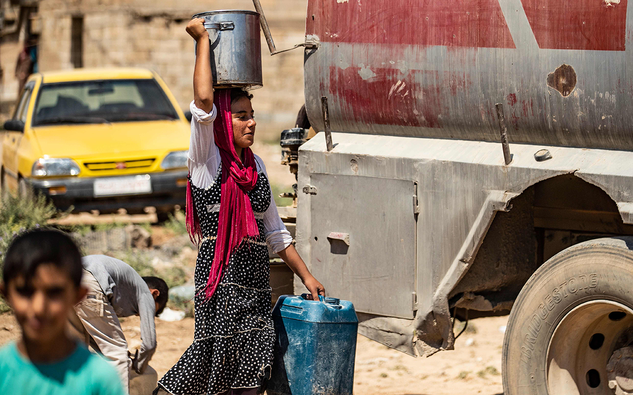A girl carries water from cisterns provided by aid groups during a water cutoff in Hasakah in northeast Syria, August 22, 2020 (AFP)
Kurdish-controlled northeast Syria is facing a water crisis amid drought and Turkey’s reported limitation of supplies.
The UN’s World Food Programme says the Euphrates River is at a “critically low level”.
The Euphrates supports more than five million people. About three million rely on electricity produced by hydroelectric dams.
In addition to rising temperatures and declining precipitation, Turkey has reportedly disrupted the Alouk water station, which provides drinking water to almost 460,000 people. Ankara claims the Assad regime has affected the station by cutting electricity to the area in Hasakah Province.
See also UN Officials to Turkey: Restore Water to Kurdish-Controlled Northeast Syria
Turkish plans to build 22 dams and 19 hydroelectric power plants on the Tigris and Euphrates Rivers may be affecting downstream flows.
A project manager for Mercy Corps said the Tishreen Dam, one of the two main barriers on the Euphrates, is 47 cm from reaching “dead level”.
He explained that each day, the water level drops by a centimetre, meaning the dam is 47 days away from going out of service.
Rising Costs, Illnesses, and Drownings
Abu Mohammad Sheikh Hussein, an 81 year-old farmer, says, “Before, whoever lived far from the river could dig for groundwater, and they used to find water. But now no matter how deep they dig, they can’t find any source of water.”
Sheikh Hussein said he and others are reliant on the Euphrates but only have about two hours of electricity a day.
The Mercy Corps manager noted that a tripling of fuel prices has made it far more expensive to pump water, with a consequent “increase in the cost of the agricultural operation, and ultimately the price of crops and goods such as bread”.
He offers little hope of improvement:
The cost of bringing [the Tishreen Dam] back into service will be massiv. As the turbines stop totally, the existing water will flood all the electricity equipment.
And due to the conflict…there is no Plan B, and there are no diesel generators to discharge the water from the tunnels to protect the electricity or electrical equipment.
The manager notes that dependence “on the stagnant water in the irrigation canals” is spreading water-borne illnesses such as diarrhoea and intestinal infection.
And he explains, “There were seven cases [in summer 2021] of people drowning in these irrigation canals when they were trying to get water. All those people are women and children.”


Trackbacks/Pingbacks